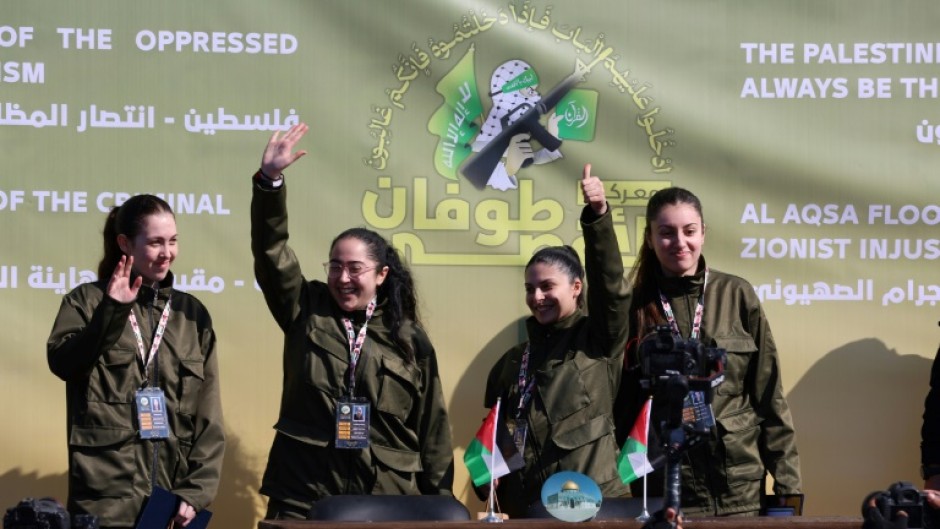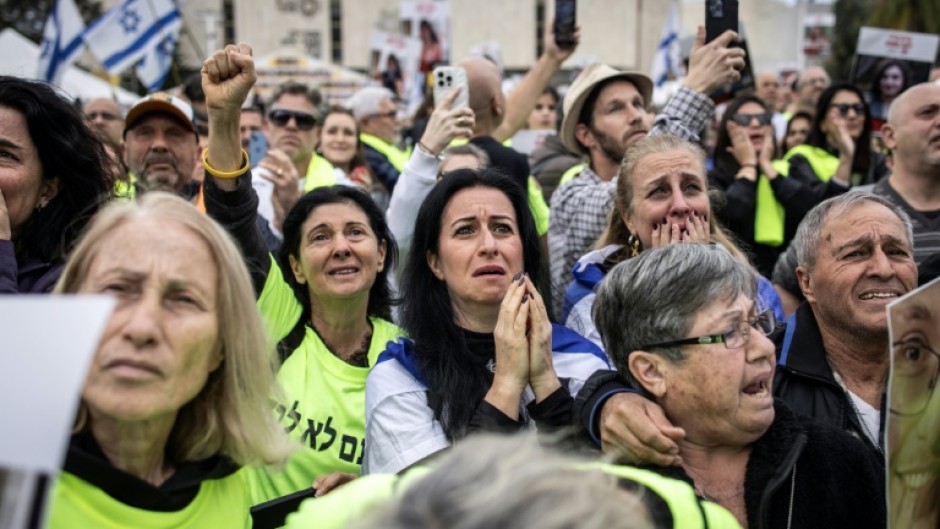Palestinian militants and Israel carried out a hostage-prisoner swap on Saturday under a Gaza ceasefire deal, but a last-minute dispute blocked the expected return of hundreds of thousands of Palestinians to devastated northern Gaza.
As part of the exchange, the second since the truce took effect last Sunday, four freed Israeli women hostages, all soldiers, arrived home in Israel after more than 15 months of captivity in Gaza.
In exchange, buses with Palestinian prisoners freed from Israeli detention left Israeli prisons, AFP journalists saw.
Karina Ariev, Daniella Gilboa, Naama Levy, all aged 20, and Liri Albag, 19, waved, smiled, and gave thumbs up as they were paraded on a stage in Gaza City, flanked by masked and armed militants, during a slick ceremony watched by hundreds of residents.
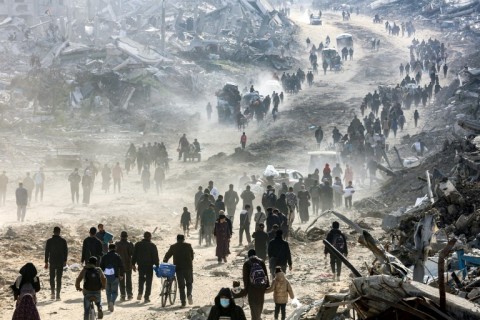
In Tel Aviv, where a crowd gathered to watch the release on a large TV screen at a plaza known as Hostage Square, there were tears of joy and applause as Israeli flags waved.
After their handover to the Red Cross, Israel's military said the women were transferred back into Israel and "reunited with their parents".
They were later taken by military helicopter to a hospital for treatment.
Health workers have warned of the psychological challenges the freed captives will face.
Following their release, AFP journalists said buses carrying Palestinian prisoners left Ofer prison in the occupied West Bank and Ktziot prison in the Negev desert.
Palestinian sources said Israel is to free 200 prisoners on Saturday.
The Palestinian Prisoners Club advocacy group said among those to be released is Mohammed al-Tous, 69, who has spent the longest continuous period in Israeli detention.
- Aid surge-
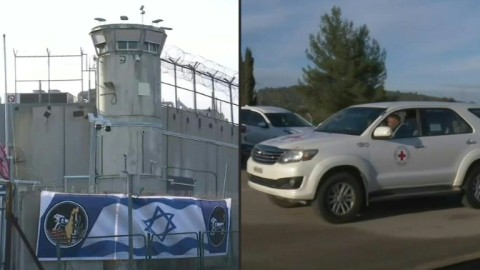
Bassem Naim, a member of Hamas's political bureau based in Qatar, had told AFP on Friday that Palestinians displaced by the war to southern Gaza should have been able to begin returning to the north following Saturday's releases.
But Israel on Saturday said it would block such returns until civilian woman hostage Arbel Yehud is released.
Prime Minister Benjamin Netanyahu's office said she "was supposed to be released today" but a Hamas source told AFP Yehud will be "released as part of the third swap set for next Saturday".
The truce has also led to a surge of food, fuel, medical and other aid into rubble-strewn Gaza, but Israel's UN ambassador on Friday confirmed that the United Nations agency for Palestinian refugees, Gaza's main aid agency, must end all operations in Israel by Thursday.
The hostage-prisoner exchange is part of a fragile ceasefire agreement between Israel and Hamas that took effect last Sunday, and which is intended to pave the way to a permanent end to the war.
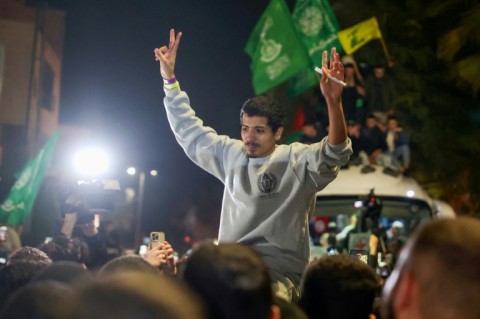
Mediators Qatar and the United States announced the agreement days ahead of US President Donald Trump's inauguration. Trump has since claimed credit for securing the deal after months of fruitless negotiations.
The ceasefire agreement should be implemented in three phases, but the last two stages have not yet been finalised.
"The worry and fear that the deal will not be implemented to the end is eating away at all of us," said Vicky Cohen, the mother of hostage Nimrod Cohen.
- 'Worry and fear' -
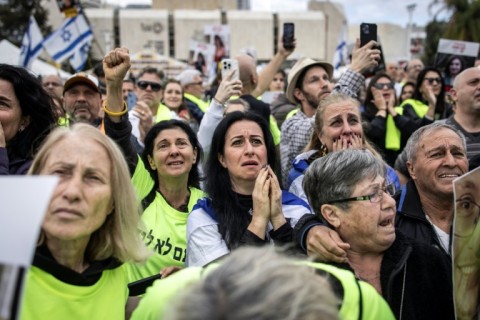
In Gaza, families displaced by more than a year of war longed to return home, but many will find only rubble where houses once stood.
"Even if we thought about returning, there is no place for us to put our tents because of the destruction," Theqra Qasem, a displaced woman, told AFP.
During the first, 42-day phase, 33 hostages Israel believes are still alive should be freed in staggered releases in exchange for around 1,900 Palestinians held in Israeli jails.
Three hostages -- Emily Damari, Romi Gonen and Doron Steinbrecher -- returned home on the first day of the truce in exchange for 90 Palestinians, mostly women and minors.
The deal's second phase is to see negotiations for a more permanent end to the war, but analysts have warned it risks collapsing because of the deal's multi-phase nature and deep distrust between Israel and Hamas.
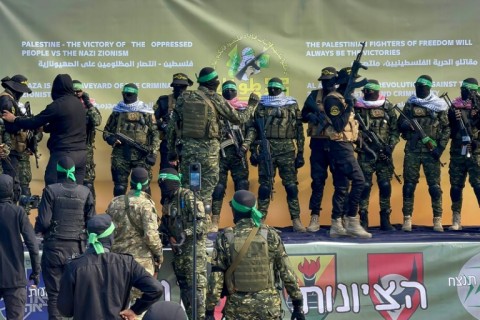
During their October 7, 2023 attack that began the war, Hamas militants took 251 hostages, 87 of whom remain in Gaza, including 34 the Israeli military has confirmed are dead.
The attack resulted in the deaths of 1,210 people, mostly civilians, according to an AFP tally based on official Israeli figures.
Israel's retaliatory response has killed at least 47,283 people in Gaza, a majority civilians, according to the Hamas-run territory's health ministry, figures which the UN considers reliable.
- 'Situation remains dire' -
Almost the entire Gaza population of 2.4 million has been displaced by the war
"Probably between 65 percent to 70 percent of buildings in Gaza have either been entirely destroyed or damaged," Achim Steiner, the head of the UN Development Programme, told AFP in Davos, Switzerland.
Hundreds of truckloads of aid have entered Gaza daily since the ceasefire began, but the UN says "the humanitarian situation remains dire".
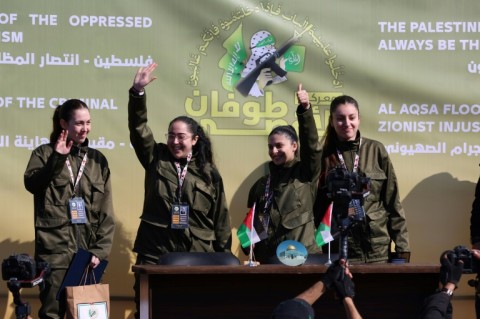
In a letter addressed to United Nations chief Antonio Guterres, Israeli Ambassador Danny Danon confirmed: "UNRWA is required to cease its operations in Jerusalem, and evacuate all premises in which it operates in the city, no later than 30 January 2025."
UNRWA chief Philippe Lazzarini warned on Friday that preventing the agency from operating "might sabotage the Gaza ceasefire, failing once again hopes of people who have gone through unspeakable suffering."
By Khader Al-zaanoun With Jay Deshmukh In Jerusalem

